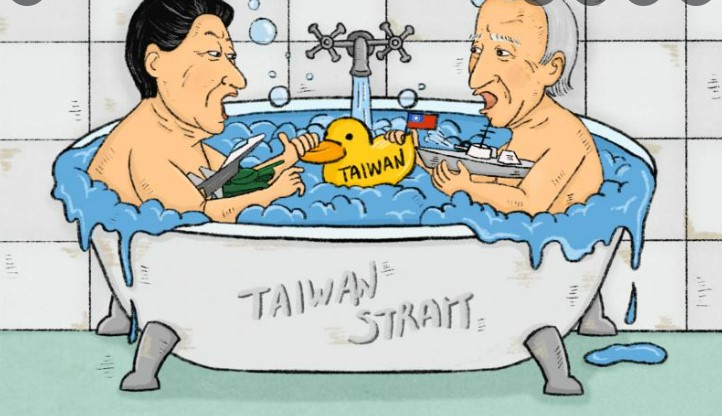Virendra Pandit
New Delhi: The world’s first and second-largest economies—the USA and China—are facing unprecedented recession and need to divert attention from home. They both zeroed in on one solution: Taiwan!
The US is facing an unprecedented recession for the first time in 40 years. In post-pandemic China, over 500,000 small and medium enterprises and dozens of bigger ones—outside of the nearly collapsed real estate sector—have shut shops this year, rendering millions of youths unemployed. And angry.
Both the US and China were desperate to divert attention from domestic problems to ‘opportunities’ overseas. For the two interdependent and intertwined economies, Taiwan eminently fitted their bill. Fanning nationalism, even jingoism, suits them as it keeps domestic attention focused overseas.
Unlike the 19th century’s postulate of ‘balance of power’ and the 20th century’s ‘balance of terror’, the 21st century marks a ‘balance of frenemies’—the same nation can at once be a friend here and an enemy there! For example, Turkey is a member of the US-led NATO and a friend of Russia!
This year’s Russian invasion of Ukraine, since February 24, has exposed chinks in the armor of the America-led West, particularly in the North Atlantic Treaty Organization (NATO), which could do little more than issue politically correct rhetoric and financially assist and arm the victim to prolong the war. Geopolitically, the US has lost face and faith and was forced to recalibrate its relations with Saudi Arabia: it forced President Joe Biden to mend the fences recently. The Saudis are also inching closer to Russia and China as well.
Russia has shown how to counter the global dominance of the US dollar as some nations—China, India included—have found alternative routes to buy Moscow’s oil. Even the European Union, Germany in particular, cannot toe the American line because of their vital dependence on Russian gas ahead of biting winter later this year.
Also, the US, which had strengthened China against the Soviet Union since the 1980s, now wanted to drag Beijing, whose largesse is funding Russia’s Ukraine war, away from Moscow and commit huge resources overseas.
Washington required some booster dose to reclaim its status as a superpower.
Just like America, China also lost face globally because of the Covid-19 pandemic. Its aftermath has seen the Chinese economy slip into recession at home and crippled funding of its global Belt and Road Initiative (BRI). Its People’s Liberation Army (PLA) is dispirited after its losses against India in 2020, and the masses are angry at the loss of their savings in over 400 banks.
China also needed a cold drink to keep peace at home.
That, in a nutshell, seems to be the reason why the two countries have, together, raised the temperature in Taiwan they know could, at best, end in a zero-sum game. They both are using the same baits against one another: sovereignty, nationalism, freedom, human rights, et al.
In this sketch, all else is fill-in-the-blanks: threats, posturing, show-offs, militaries flexing muscles to keep the pot boiling short of a breaking point.
US House of Representatives Speaker Nancy Pelosi’s high-profile visit to Taiwan eminently suits both the US and China. On Tuesday, she became the highest-ranking American official in 25 years to visit the self-ruled island.
China announced military maneuvers in retaliation, even as Taiwanese officials welcomed her and she headed to her hotel. As usual, Beijing issued threats, summoned the US Ambassador to protest, and asked the British lawmakers to avoid Taiwan.
Neither Beijing nor Washington—they know they highly depend on each other to keep their economies going—would go beyond a point. It became clear when President Joe Biden piped down and tried to pour cold waters. He, as also Pelosi, sought to calm the Chinese grouse that Taiwan was its ‘inseparable’ part and insisted there is no change in America’s longstanding “One-China Policy,” which recognizes Beijing but also allows informal relations and defense ties with Taipei.
Pelosi, who had earlier supported pro-democracy activists in 1991 at the time of the Tiananmen Square violence in Beijing, also recently led a congressional delegation to the Ukrainian capital of Kyiv. All nations put some of their eggs in all the baskets. Democracy is more of a geopolitical tool than a sacrosanct belief.
The self-ruled island Taiwan (formerly Formosa), and mainland China split during a civil war in 1949. But China claims the island as its own territory and has not ruled out using military force to take it.
While they are sending warships and aircraft around Taiwan, Chinese President Xi Jinping and his US counterpart Joe Biden made clear last week that they don’t want a conflict. In a call with Biden last week, Xi echoed a theme of Biden’s — their countries should cooperate in areas where they can.
“Despite a chorus of nationalistic rhetoric, China will be careful not to stumble into a conflict with colossal damages on all fronts,” said Yu Lie, a senior research fellow at the Chatham House think tank.
For China, the best approach is patience and time, he said — building toward the day when its economy and military could be too big for the US to challenge.
That is why China showed spirit after weeks of threatening rhetoric but stopped short of direct military confrontation.
Bringing Taiwan, an island of 23 million people just 160 kilometers (100 miles) off China’s east coast, under Chinese control is a longstanding goal of the Chinese Communist Party which claims Taiwan is part of China and that the US and other countries have no right to meddle in what it considers a domestic issue.

